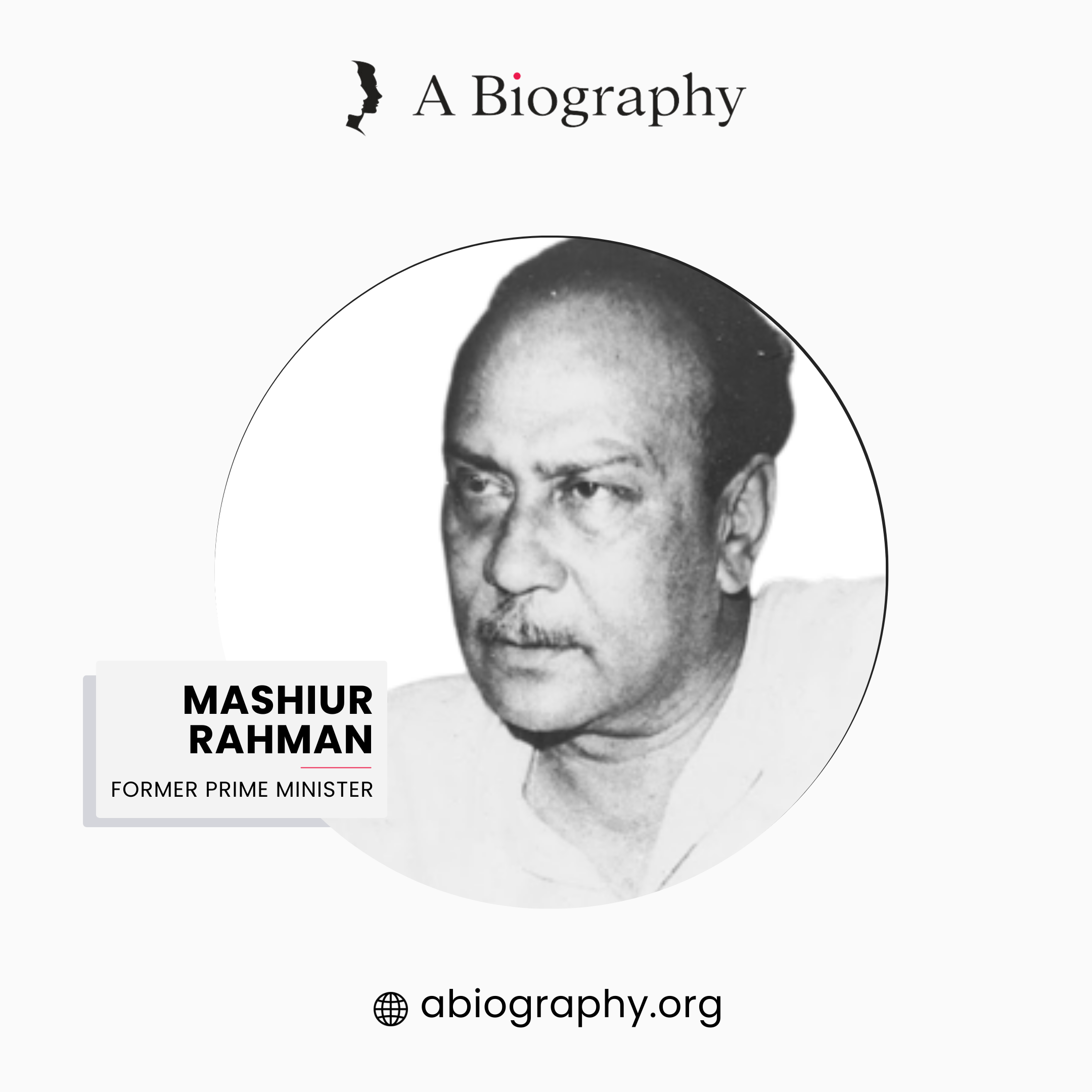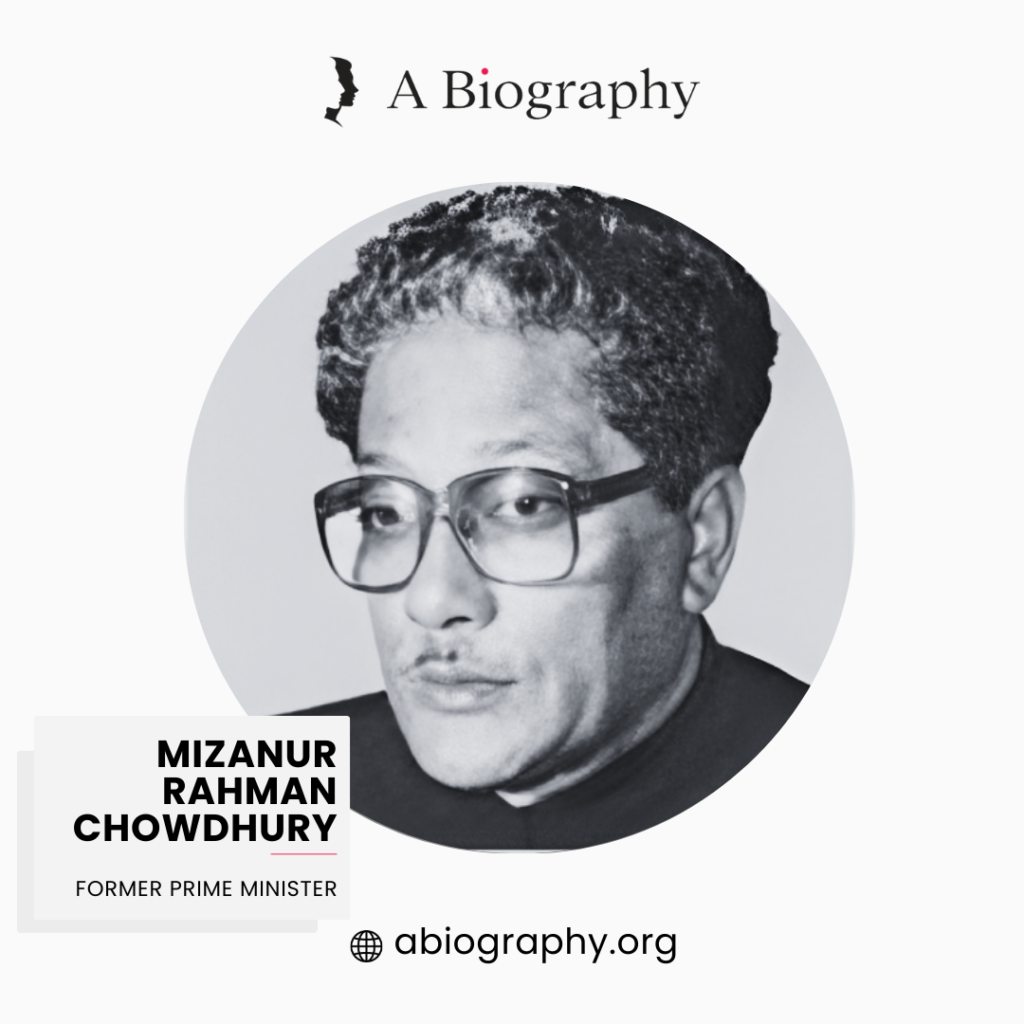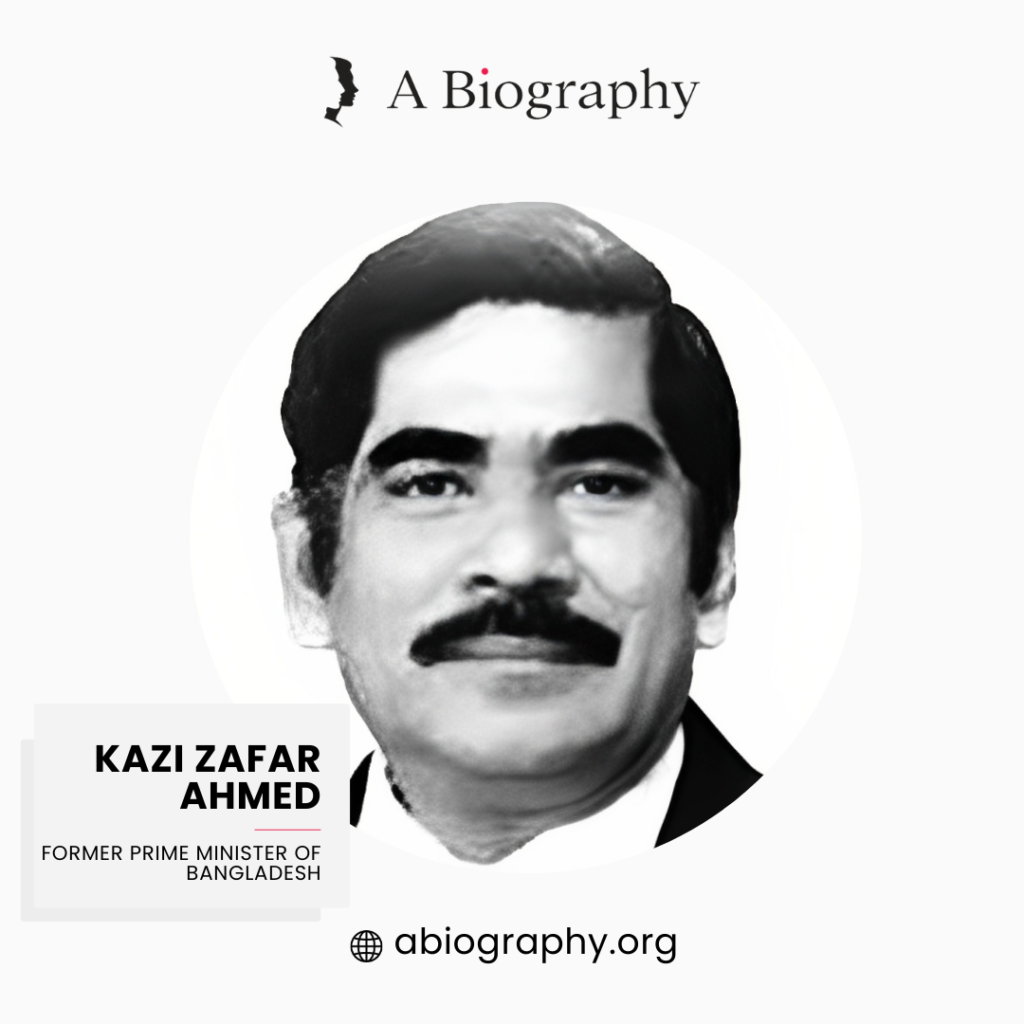BIOGRAPHY OF MASHIUR RAHMAN
(Former Prime Minister)
(9 July 1924 – 12 March 1979)
Table of Contents
ToggleIntroduction
Mashiur Rahman, also known as Jadu Mia, held a significant role as a senior minister and effectively served as the prime minister in charge of Bangladesh’s Ministry of Railways, Roads, and Highways from June 29, 1978, to March 12, 1979. Mashiur Rahman played a pivotal role in the establishment of multi-party democracy and was the driving force behind the formation of the Bangladesh Jatyiotabadi Dal.
Mahiur Rahman named the party and secured its election symbol from his own party, the NAP. Furthermore, he took the initiative to formally declare the independence of Bangladesh from the NAP. This occurred on March 23, 1971, while Sheikh Mujib was still negotiating for the premiership of Pakistan with the military junta. No formal declaration was given despite the people’s strong desire for a free and independent nation.
Life Of “Mashiur Rahman” At A Glance
◉ Known For: Senior Minister, with the rank and status of Prime Minister, of Bangladesh
◉ Born: 9 July 1924
◉ Age: 54
◉ Birthplace: Rangpur
◉ Nationality: Bangladeshi
◉ Father: Osman Goni
◉ Mother: Al-hajj Abiun Nessa
◉ Education:
➣ Dhaka University
◉ Occupation:
➣ Senior Minister
➣ Prime Minister
◉ Spouse:
➣ Sabera Mashiur Rahman
➣ Amina Mashiur Rahman
◉ Children:
➣ Shawfikul Ghaani Shawpan
➣ Mansura Mohiuddin
◉ Death: 12 March 1979
Early Life
Rahman’s birth took place on July 9, 1924, in Rangpur, British India, which is now known as Khaga Khari Bari village in Dimla Upazila of Nilphamari District, Bangladesh. His father Osman Goni was a respected person. His mother’s name is Al-hajj Abiun Nessa.
Education and Career
Mashiur Rahman commenced his early education at Khaga Khari Bari school in his village. He attended this school until the 3rd grade. Subsequently, he continued his studies at Coronation High School in Gopalganj. After successfully completing his Entrance Examination from Rani Brindarani High School in Dimla, Rangpur, Mashiur Rahman enrolled at Dhaka University to pursue his higher education.
In 1962, Rahman was elected as a member of the National Assembly of Pakistan and served as the deputy leader of the opposition. However, in 1963, he was arrested due to his participation in the anti-government movement.
In 1971, prior to the liberation war, Rahman made a formal declaration of Bangladesh’s independence. He urged the formation of an all-party government during a public gathering at Paltan Maidan on 23 March. Around the same time, he assumed the role of deputy leader under Abdul Hamid Khan Bhashani in the National Awami Party.
Following the death of Bhashani in 1976, Rahman assumed the presidency of the Bhashani faction of the National Awami Party. Subsequently, in 1978, he joined the Jatiyotabadi Front (Nationalist Front) along with a significant portion of the National Awami Party (Bhashani). This led to the dissolution of the party, which remained inactive for nearly three decades until it was revived in 2006 by his eldest son, Shawfikul Ghaani Shawpan.
Rahman was a founding member of the Bangladesh Nationalist Party convening committee. He successfully contested and won the Rangpur-1 seat in the 1979 General Election, becoming a Member of Parliament. Despite Ziaur Rahman’s intentions to appoint him as prime minister, Shah Azizur Rahman was chosen for the position after Rahman’s sudden death on 12 March 1979.
Following the assassination of Sheikh Mujibur Rahman in 1975, the position of Prime Minister of Bangladesh was abolished. However, when Ziaur Rahman assumed power in November 1975 and became the President of Bangladesh on 21 April 1977, a ministerial system was reinstated. Mashiur Rahman served as a senior minister with the rank and status equivalent to that of a prime minister, overseeing the Ministry of Railways, Roads, and Highways of Bangladesh from 29 June 1978 to 12 March 1979.
Personal Life
Rahman had two marriages, one with Sabera Mashiur Rahman and another with Amina Mashiur Rahman. He had 11 children, comprising 5 sons and 6 daughters. Among his children, his eldest son Shawfikul Ghaani Shawpan served as a minister during the presidencies of Ziaur Rahman and Hussain Muhammad Ershad. Additionally, his eldest daughter Mansura Mohiuddin had the honor of being elected as a member of parliament twice.
Death
Mashiur Rahman passed away on March 12, 1979, while serving as Senior Minister with the position of Prime Minister. Due to an incident, he had a bleeding injury in the brain. He was admitted to PG Hospital Dhaka (Bangabandhu Sheikh Mujib Medical University Hospital). He was senseless for a few days and eventually died on March 12th.
Following his demise, a three-day period of state mourning was held, and he received a state funeral with complete honour, including a 19-gun salute. Upon hearing of his unexpected death, numerous foreign dignitaries and heads of state, including former US president Jimmy Carter, sent letters of condolence.
Legacy
From an early age, he participated in politics. During the second world war, he went to Myanmar and serve the injured soldiers. In the year of 1940s, a plague broke out near Rangpur. Mashiur Rahman was brave enough to jump into the situation and served the people. As an acknowledgment, an area was named after him as Jadur Char.
In 1946, at the time of the Hindu-Muslim war, Mashiur Rahman published an article describing how bad it was and its effects on society. At the end of the 1940s, he was the chief of East Pakistan at the Youngman Association Of Pakistan. He also was the Honourary Secretary of Rangpur Sports Organization. From 1954 to 1958 he was the elected Secretary of the Rangpur Consumers Co-Operative Society.
At the end of 1950s, he was elected as the youngest Chairman of the Rangpur Board. He was elected twice and retired after completing his duty towards society. In 1957, East Pakistan Youth League held a Youth festival committee where Mashiur Rahman was the chairperson. In the same year, Bhashani invited him to the Kagmari conference program where he played a leading role.
Conclusion
Mashiur Rahman left an indelible mark in each stage of his life. When he passed away unexpectedly, people mourned deeply and held a grand funeral to honor his contributions and leadership. Leaders from around the world sent condolences, showing how much he mattered on a global scale. His dedication to serving the public and his reputation as a respected statesman still inspire people today. His memory will always be remembered in the history of the country.



